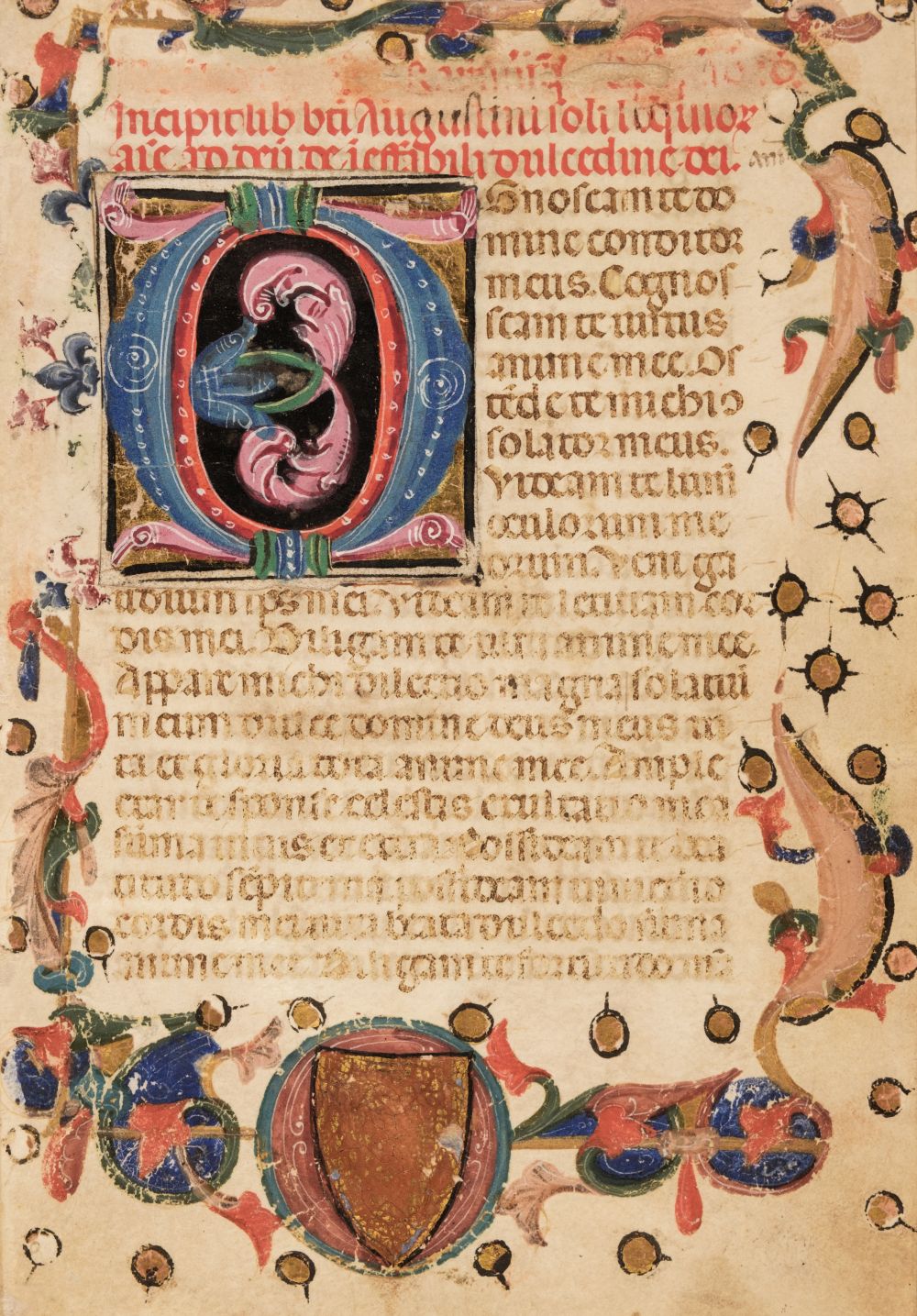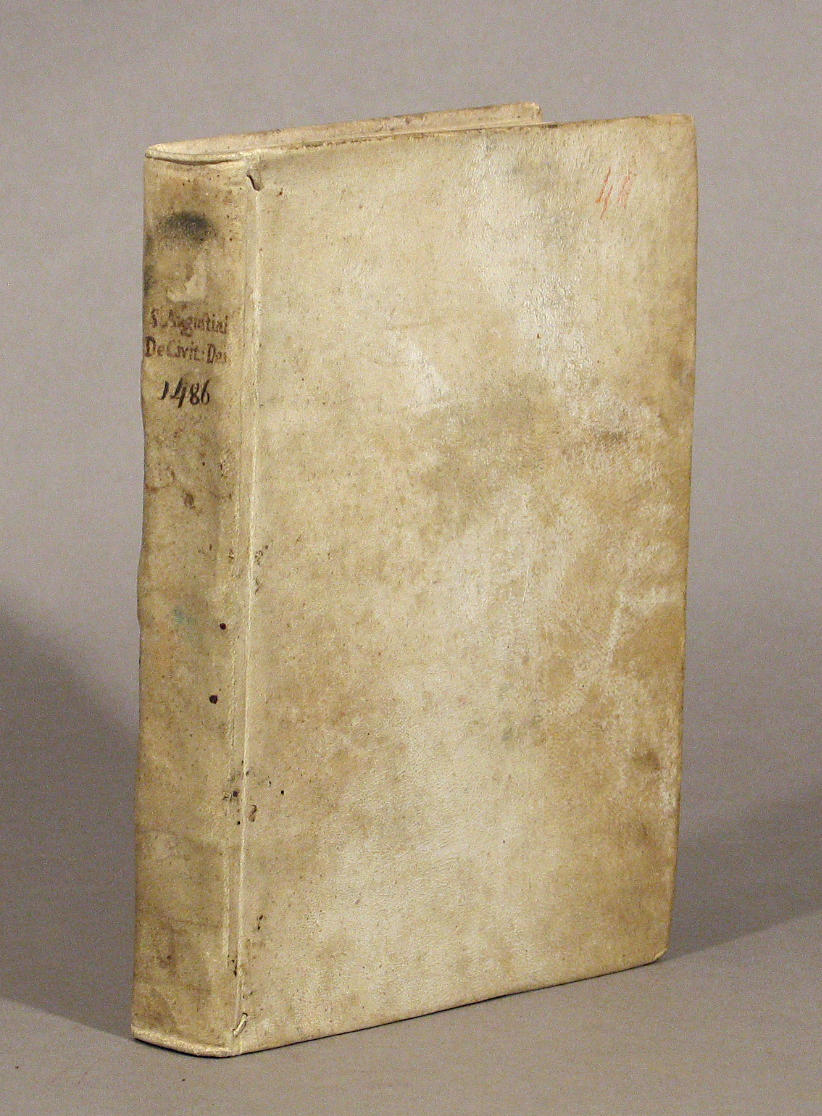Saint Augustine's Confessiones, decorated medieval manuscript on vellum, with 11 homilies from Hugh of St-Victor's In Salomonis Ecclesiasten, written during his lifetime, 310 x 218 mm, probably Italy, mid-12th century, 104 leaves (Confessiones, ff 1- 75v; In Salmonis Ecclesiasten, ff 76r-104), double column, 39-40 lines in brown ink, some medieval corrections, rubrics in red, nineteen large 5-to 9-line ornate red initials with simple penwork tracery and flourishes. Red morocco, spine lettered in gilt, repair to ff 16 and 78, marginal staining to first leaf, trimmed, ff 37 and 83 untrimmed, with edges folded in, occasional stains, occasional holes in margins of leaves. Provenance: Produced in a monastic scriptorium in Italy, probably Cistercian, in the mid twelfth century, partially erased inscription on 1r, apparently "Venerabilis conventus syon' ..."; Guglielmo Libri (1803-69); his sale, Sothebys, London, March 28, 1859, lot 105, to Henry Stevens of Vermont (1845-86); slipped by Stevens into his sale of the library of Edward A. Crowninshield of Boston, Puttick and Simpson, July 12, 1860, lot 252, to Willis; acquired from Willis, 1861, by Sir Thomas Phillipps (1792-1872, his MS.16066); his sale, Sothebys, London, June 15, 1908, lot 43; Bergendahl Collection MS.31 (bought by Joseph Pope from John Fleming November, 1982; Bergendal catalogue no 31; Stoneman "Guide" p 179); sold "Western Manuscripts and Miniatures," Sothebys, London, July 5, 2011, lot 40). "THE INVENTION OF THE INNER SELF" - AN EXCEPTIONALLY RARE EARLY MANUSCRIPT OF SAINT AUGUSTINE'S CONFESSIONS, "THE FIRST GREAT AUTOBIOGRAPHY" (PMM 7). Creating a new genre of literature, the Confessions is a philosophic memoir of the highest order, intimately recording Augustine's quest for truth and certainty, and counterposing Plato to the salvational perspective of the New Testament. Acknowledging eternal truth in classical philosophy (and Platonism in particular) as well as in Christianity, Augustine affirms a distinctive New Testament doctrine in the quality of grace and the superior merit of the Christian belief – precipitating his conversion to Christianity. In wrestling with the notion of the human self and its inner life, Augustine essentially "invented the concept of private inner space" (Cary, Augustine's Invention of the Inner Self, Oxford, 2003, p 3), fundamentally creating the intellectual framework of the modern human psyche. "The product of highly articulate philosophical inquiry", Augustine's "inner space" is "a dimension or level of being belonging specifically to the soul, distinct from the being of God above ... and from the world of bodies outside it" (Cary, pp 3-4). Over the course of the centuries Augustine's notion of the inner self "worked its way deeply into the intellectual heritage of the West and therefore into the experience of Western individuals" (Cary, p 3). Augustine's notion of the "inner self" is actively at work even today, its conception effectively shaping the ground of Heidegger's Being and Time, a foundation of 20th century philosophy. "Remarkable for what he did and extraordinary for what he wrote" (Britannica), Augustine was famous in his own day, his sermons drawing thousands of auditors, while his writings, estimated at 5 million words, comprise the largest surviving corpus of any ancient author. Hailed as "The Father of Western Theology," Augustine's "distinctive theological style shaped Latin Christianity in a way surpassed only by scripture itself" (Encyclopedia Britannica, 11th edition). As the Confessions itself evidences, Augustine's importance extends beyond religion: Augustine's thought – and his Confessions most of all – was the main conduit through which the Platonic philosophy reached medieval Europe, acting as a primary catalyst for the 12th-century rediscovery of ancient Greek science and mathematics. This notable manuscript is a distinct product of the 12th century Renaissance, an epoch which witnessed the rebirth of sci
Saint Augustine's Confessiones, decorated medieval manuscript on vellum, with 11 homilies from Hugh of St-Victor's In Salomonis Ecclesiasten, written during his lifetime, 310 x 218 mm, probably Italy, mid-12th century, 104 leaves (Confessiones, ff 1- 75v; In Salmonis Ecclesiasten, ff 76r-104), double column, 39-40 lines in brown ink, some medieval corrections, rubrics in red, nineteen large 5-to 9-line ornate red initials with simple penwork tracery and flourishes. Red morocco, spine lettered in gilt, repair to ff 16 and 78, marginal staining to first leaf, trimmed, ff 37 and 83 untrimmed, with edges folded in, occasional stains, occasional holes in margins of leaves. Provenance: Produced in a monastic scriptorium in Italy, probably Cistercian, in the mid twelfth century, partially erased inscription on 1r, apparently "Venerabilis conventus syon' ..."; Guglielmo Libri (1803-69); his sale, Sothebys, London, March 28, 1859, lot 105, to Henry Stevens of Vermont (1845-86); slipped by Stevens into his sale of the library of Edward A. Crowninshield of Boston, Puttick and Simpson, July 12, 1860, lot 252, to Willis; acquired from Willis, 1861, by Sir Thomas Phillipps (1792-1872, his MS.16066); his sale, Sothebys, London, June 15, 1908, lot 43; Bergendahl Collection MS.31 (bought by Joseph Pope from John Fleming November, 1982; Bergendal catalogue no 31; Stoneman "Guide" p 179); sold "Western Manuscripts and Miniatures," Sothebys, London, July 5, 2011, lot 40). "THE INVENTION OF THE INNER SELF" - AN EXCEPTIONALLY RARE EARLY MANUSCRIPT OF SAINT AUGUSTINE'S CONFESSIONS, "THE FIRST GREAT AUTOBIOGRAPHY" (PMM 7). Creating a new genre of literature, the Confessions is a philosophic memoir of the highest order, intimately recording Augustine's quest for truth and certainty, and counterposing Plato to the salvational perspective of the New Testament. Acknowledging eternal truth in classical philosophy (and Platonism in particular) as well as in Christianity, Augustine affirms a distinctive New Testament doctrine in the quality of grace and the superior merit of the Christian belief – precipitating his conversion to Christianity. In wrestling with the notion of the human self and its inner life, Augustine essentially "invented the concept of private inner space" (Cary, Augustine's Invention of the Inner Self, Oxford, 2003, p 3), fundamentally creating the intellectual framework of the modern human psyche. "The product of highly articulate philosophical inquiry", Augustine's "inner space" is "a dimension or level of being belonging specifically to the soul, distinct from the being of God above ... and from the world of bodies outside it" (Cary, pp 3-4). Over the course of the centuries Augustine's notion of the inner self "worked its way deeply into the intellectual heritage of the West and therefore into the experience of Western individuals" (Cary, p 3). Augustine's notion of the "inner self" is actively at work even today, its conception effectively shaping the ground of Heidegger's Being and Time, a foundation of 20th century philosophy. "Remarkable for what he did and extraordinary for what he wrote" (Britannica), Augustine was famous in his own day, his sermons drawing thousands of auditors, while his writings, estimated at 5 million words, comprise the largest surviving corpus of any ancient author. Hailed as "The Father of Western Theology," Augustine's "distinctive theological style shaped Latin Christianity in a way surpassed only by scripture itself" (Encyclopedia Britannica, 11th edition). As the Confessions itself evidences, Augustine's importance extends beyond religion: Augustine's thought – and his Confessions most of all – was the main conduit through which the Platonic philosophy reached medieval Europe, acting as a primary catalyst for the 12th-century rediscovery of ancient Greek science and mathematics. This notable manuscript is a distinct product of the 12th century Renaissance, an epoch which witnessed the rebirth of sci












.jpg)


Try LotSearch and its premium features for 7 days - without any costs!
Be notified automatically about new items in upcoming auctions.
Create an alert